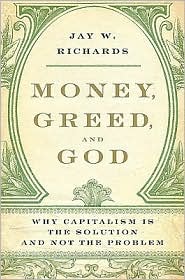|
|
|
Capitalism often takes a beating in the press and even in the pulpit. It is blamed for everything from corruption and greed to polluting the environment. In Money, Greed, and God: Why Capitalism is the Solution and Not the Problem, economist Jay W. Richards explains why eight prevailing myths about the evils of capitalism are unfounded. The author recounts his own ideological transformation from a college freshman with a "vaguely Christian… infatuation with Marxism" to a fully convinced capitalist. Richards tackles the "myth" that wealth is not created, but only transferred. Many people assume that all of the available wealth in the world is like a cherry pie, and if some people get thick slices, others must settle for thin slivers. This conception of wealth is limited to material realities such as property, oil and gold, and ignores the greatest resource for wealth creation- human ingenuity. It was the human mind that conceived a way to use only two characters- 0 and 1- to convey complex information via binary code. The human mind also devised a way to use silica, a readily available and inexpensive resource, to make the computer chips and fiber-optic cables to carry information around the globe. Computer-related innovations alone have generated previously unimaginable work opportunities and considerable affluence for millions of people. Richards also challenges unfair comparisons between capitalism and unrealizable utopian ideals, exposes the moral inadequacy of focusing on good intentions rather than the actual consequences of our actions, debunks the misconception that trade requires winners and losers, and disputes the notion that the heart of capitalism is greed. Christians desiring to integrate their faith with their economic philosophy aren’t the only ones who can benefit from this book. Anyone searching for clarity about how capitalism squares with ethical mores or desiring well-reasoned ammunition against the socialist approach that is gaining popularity in America will find this book helpful. (HarperOne, 2009, 255 pages, $24.99) |
 As a result of this background and his sincerely held biblical values, Richards is able to take a sympathetic rather than patronizing tone with readers who mean well but share his past patterns of fuzzy and uninformed thinking. He examines both Scripture and economic arguments to make a compelling case for the rule of law, property rights, and free market economies using laymen’s language and contemporary examples.
As a result of this background and his sincerely held biblical values, Richards is able to take a sympathetic rather than patronizing tone with readers who mean well but share his past patterns of fuzzy and uninformed thinking. He examines both Scripture and economic arguments to make a compelling case for the rule of law, property rights, and free market economies using laymen’s language and contemporary examples.

